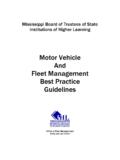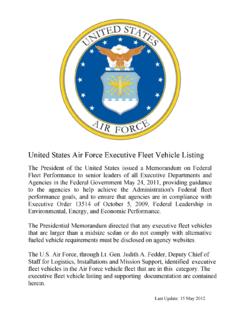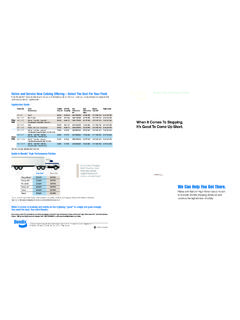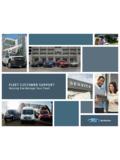Transcription of BEST PRACTICES MANUAL 2008 - Fleet Challenge
1 Municipal Green Fleet management in OntarioBEST PRACTICES MANUAL2008 Prepared by: Fleet Challenge Challenge Ontario best PRACTICES MANUAL 2008 Municipal Green Fleet management in OntarioIntroductionGiven today s increasingly pressing environmental concerns, along with soaring fuel prices and the likelihood of continuing increases, a great opportunity exists for the municipal Fleet operator to seek out new cost efficiencies while taking a leadership role on environmental issues in their community. The following 2008 best PRACTICES MANUAL has been prepared by Fleet Challenge Ontario through the Ontario Ministry of Finance s Strengthening Our Partnerships initiative, with the support of the Ontario Ministry of Transportation. This best PRACTICES MANUAL is part of a broader pilot program designed to assist Ontario municipalities in understanding and delivering on opportunities to instigate Fleet efficiencies and achieve associated environmental benefits.
2 Information in this MANUAL has been structured so as to provide an end-to-end blueprint for initiating, deploying, and maintaining a green Fleet . Sections have been developed in consultation with Ontario municipal Fleet stakeholders, Fleet management experts, and by the study team. Where applicable, information has been supplemented by additional is expected that this best PRACTICES MANUAL , through providing discussion on and tangible examples of currently available and cost-effective automotive Fleet management PRACTICES , will enable Fleet managers to reduce the pollution that causes global warming and poor air quality, while at the same time saving money and improving workplace health and community views expressed in the best PRACTICES MANUAL are the views of Fleet Challenge Ontario and do not necessarily reflect those of the Government of Challenge Ontario best PRACTICES MANUAL 2008 Municipal Green Fleet management in OntarioContentsAbout Fleet Challenge Ontario.
3 5 Acknowledgements ..5 Background ..6 Structure of the Report ..7 Section : Creating a Green Fleet Plan the Municipal Challenge .. Policy Developments Affecting Municipal Fleet management in Canada .. What is a Green Fleet ? .. Getting management Buy-In to a Green Fleet Plan ..15 Section : Managing Green Fleet Assets Effectively .. Life Cycle Analysis and Fleet Retention Strategies .. Selling and Remarketing .. End-Of-Life Vehicle Disposal .. 33 Section : Maintaining a Successful Green Fleet .. Maintaining the Green Fleet .. Understanding Hybrid Maintenance and What Every Fleet Manager Needs to Know .. ISO 14001 compliance and green shop PRACTICES ..424 Fleet Challenge Ontario best PRACTICES MANUAL 2008 Municipal Green Fleet management in OntarioSection : Reduced Idling and Alternative Fuels.
4 Reducing the Use of Gasoline and Diesel: Idling Reduction .. Using Biodiesel in the Fleet Environment .. Natural Gas Options for Fleets Brief Perspectives from the Canadian Natural Gas Vehicle Alliance .. Considerations in Fuel Procurement ..60 Section : management Software to Optimize Fleet Efficiency .. The E3 Program and Fleet Software Attributes ..64 Section : Summary and Conclusion ..68 Appendix A: SAP Data Features ..765 Fleet Challenge Ontario best PRACTICES MANUAL 2008 Municipal Green Fleet management in OntarioAbout Fleet Challenge OntarioFrom September 2007 March 2008 , the Ministry of Finance, with the support of the Ministry of Transportation and through the Strengthening Our Partnerships initiative, funded a pilot program designed to effect change in Ontario s municipal Fleet sector: Fleet Challenge Ontario.
5 Fleet Challenge Ontario was designed to assist Ontario municipalities in understanding and delivering on opportunities to instigate Fleet efficiencies and achieve associated environmental benefits. This objective was accomplished through the design and execution of the following three elements:A set of 12 (1) pro bono municipal green Fleet reviews using the E3 evaluation framework. E3 has similar principles to LEED environmental certification for buildings but is Fleet focused. E3 reviews were performed to ascertain Fleet operating baselines and identify areas for cost-savings; Three workshops in early 2008 in order to provide interested municipalities across Ontario with the (2) information and access to tools and resources to be able to move forward on green Fleet PRACTICES ; and, A best PRACTICES MANUAL , which would showcase municipal efficiency achievements and key findings (3) of the Fleet reviews and workshop components.
6 Upon publication, this MANUAL would be made available to all municipalities and serve as an ongoing reference to Fleet managers. The following 2008 best PRACTICES MANUAL has been prepared as part of the specified outcomes of the Fleet Challenge Ontario program. It is anticipated that this information will be of interest and provide ongoing economic and environmental value to municipal Fleet managers, their constituents, and other stakeholders across Ontario and Author: Melissa Felder, Fleet Challenge OntarioContributing Authors: Roger Smith, Nima Maleki, Ken Dack, Darlene Varaleau, and John Lyon, Fleet Challenge OntarioProject Steering Committee: Jarret Hetu, Isabelle St. Pierre, Ken Elsey, Rebecca Ramsarran, Julius Gorys, and Matronilo Tindugan Expert content excerpted from FCO 2008 workshops: Bob Oliver (Pollution Probe), Chris Hill (City of Hamilton), Andrew Jardine (University of Toronto), Steve Plaskos (City of Toronto), Fatima Dharsee (Clean Air Foundation), Steve Fletcher (Canadian/Ontario Automotive Recyclers Association), Fraser Bull (City of Toronto), Alicia Milner (Canadian Natural Gas Vehicle Alliance), Jim Suffak (City of Thunder Bay), John Neate (ETV Canada/OCETA), Steve Guerin (ETV Canada/OCETA), Sean Puchalski (U-CON), and Greg Prue (Netistix).
7 Special thanks to the City of Sudbury, the City of London, and City of Ottawa for hosting FCO 2008 . 6 Fleet Challenge Ontario best PRACTICES MANUAL 2008 Municipal Green Fleet management in OntarioBackground Heatwaves, storms, floods and other disastrous weather events have focused global attention on the serious threat that climate warming poses to local Recent findings of the Intergovernmental Panel on Climate Change indicate that the global warming process is progressing even more rapidly than expected. Warming of the climate system is unequivocal, as is now evident from observations of increases in global average air and ocean temperatures, widespread melting of snow and ice, and rising global average sea level. Eleven of the last twelve years (1995-2006) rank among the twelve warmest years in the instrumental record of global surface temperature since 1850, with 2006 being the warmest winter on record since greenhouse gas emissions due to human activities have grown since pre-industrial times, with increases on order of 70% between 1970 and 2004.
8 In urban areas, the major greenhouse gas emissions are carbon dioxide (CO2) and methane (CH4). Carbon dioxide is emitted when fossil fuel-based energy is used by households, institutional and commercial buildings, industry, and in particular: auto Given today s increasingly pressing environmental concerns, along with soaring fuel prices and the likelihood of continuing increases, a great opportunity exists for the municipal Fleet operator to seek out new cost efficiencies and simultaneously take on a leadership role on community environmental issues. To start, municipal Fleet managers would be well served by careful review of their fuel expenditures, an asset management perspective of Fleet operations and a clear mechanism or guidelines for reducing Fleet fuel costs.
9 Although not yet widespread, comprehensive data collection and evaluation is becoming gradually more recognized as critical to effective Fleet operation and cost management . For example, Fleet Challenge s work with 12 select Ontario municipalities has identified savings on order of close to 1 m liters of fuel and costs of almost $5 m for cumulative downtime and preventative maintenance, among other best PRACTICES Guide provides examples of currently available, cost-effective automotive Fleet management policies and PRACTICES that can reduce the pollution that causes global warming, while at the same time saving money and improving workplace health and the livability of our communities. The basis for this guide is the collective experience of Fleet management experts and select local governments in The International Council for Local Environmental Initiatives (2007)2 National Oceanic and Atmospheric Administration3 Methane is emitted in urban areas as waste decomposes in landfills and from wastewater and sewage treatment is Global Warming?
10 The ability of the gases that make up our atmosphere to trap the sun s heat has long been recognized as a natural greenhouse effect that makes the earth habitable. Human activity has created a rapidly changing imbalance in the proportion of theses gases, which is enhancing the natural greenhouse effect and causing the planetary climate system to change. These changes in climate and resultant weather patterns threaten the infrastructure upon which we depend. Among many other impacts, sea levels are expected to increase between 7 39 inches by the end of the century, enough to inundate thousands of miles of coastal areas. Higher average temperatures could promote an increase in ground-level air pollution or smog resulting in increased human health problems such as asthma and other respiratory ailments.





